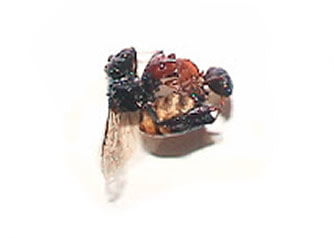
Ants vs. Bees
I wanted to share my experience with the challenges I have been having with Bull Ants in the bee-yard. Bull Ants are a constant threat to your bees. If you have a weak colony the Bull Ants can quickly attack the bees in an effort to claim the honey in the hive. Once the Bull Ants have destroyed most of the bees they will often move in and begin nesting in the hive. It is a very unpleasant surprise to find that you are now the keeper of a nest of Bull Ants, rather than a hive of honey bees!
Trying to do things rights
I try to avoid using any chemicals, preservatives, or pesticides in our operations. I feel that although they may offer a quick and effective solution, they also may compromise the quality of our hive products. I want our customers to be assured they are receiving a fresh, all natural product, that is as pure as it is healthy. Unfortunately, this means that our bees are more susceptible to pests such as ants and small hive beetles. I have had a few hives attacked by Bull Ants, and they are a constant nuisance as they forage for food in, on, and around the hives. However, I have discovered a few strategies that can be used to combat the ants naturally, without the threat of harming the bees.
Fighting Bull Ants Naturally
The first strategy I used was to elevate the hive on concrete blocks. I then set the blocks on a tray which I filled with vegetable oil. The ants could not pass through the vegetable oil and soon gave up on trying to infiltrate the hive. I also found that filling the tray with water was equally effective. Next, I discovered that it is only a weak hive that is susceptible to the sustained attack of the Bull Ants. So as with so many other bee-yard pests, if you maintain strong colonies you will avoid many of the problems that pests can cause. Also, make sure to use an entrance reducer on any colonies that are weak. This will help the bees to defend the entrance of the hive. I had an experienced beekeeper tell me that you do not need to use entrance reducers at all in Florida. I strongly disagree. If you can keep all of your colonies strong that is the best solution. However, if you need to make a split, or you end up with a weak colony for some other reason, the entrance reducer will make all the difference in the world.
Here are some natural approaches to fending off ants. If you can find the source of the ants that are disturbing the hives you can boil water and pour it directly on the ant hill. This will kill the ant colony. Also, I have been told that if you sprinkle cinnamon around the hive it will deter ants. I have also used a mixture of sugar with boric acid to kill ants. They take the mixture back to the nest and feed on the boric acid along with the sugar.
What Happens When Bees and Ants Fight?
I captured a photo of a bee struggling to defend itself from an attacking Bull Ant. It seems that the Bull Ants will attack the bees by biting their wings. I have also seen a Bull Ant kill a bee by biting the tip of the bee’s stinger as the bee tried to defend itself. With this particular bee the ant clamped its large jaws around the singer itself and even after the bee had killed the ant the head of the ant remained tightly clenched to the bee’s partially exposed sting. The bee struggled to remove the now dead ant, but could not free itself. I tried to assist by crushing the head of the ant. Even after my attempt the ants mandibles remained tightly clasped to the sting. Finally, the bee pulled and pulled against the dead ant until the sting separated from the bees body. Thus the bee was free from the ant, but the action of freeing itself ensured that the bee would soon die.
Conclusion
The message here is that Bull Ants can destroy a hive quickly once they launch an attack. So the beekeeper must act quickly to counter the Bull Ants as soon as they are detected.
Please share your experiences! You can post a description of your bee-yard pests in the comments sections below. If you have any tips for dealing with pests in or around the apiary please post them!